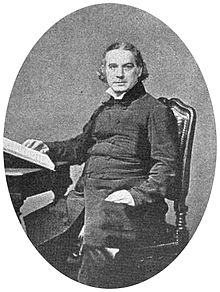Johann Konrad Wilhelm Löhe
Johann Konrad Wilhelm Löhe | |
|---|---|
Lutheran | |
| Ordained | 1831 |
Johann Konrad Wilhelm Löhe (21 February 1808 – 2 January 1872) (often rendered 'Loehe') was a pastor of the
Birth and early life
Löhe was born on 21 February 1808 in the town of
Pastoral work

Löhe's work in
By most accounts, Löhe was an ideal pastor who interacted well with a variety of different classes of people. He focused his theological studies on the Lutheran Confessions and put considerable thought into the celebration of
Missionary work
This section possibly contains original research. (August 2015) |
Despite being confined to a pastorate in an out-of-the-way village, which he never left, Löhe nevertheless exhibited a keen interest in missionary work. He was particularly concerned about the condition of German immigrants to North America. He solicited funds through a variety of sources to help bolster the spiritual state of the immigrant population beginning in 1841.
In 1843, responding to
Löhe also encouraged the sending of pastors to North America to assist the settlers and help with conversion of the Native American populations. To this end, he constructed two schools to train missionaries, one of which became Wartburg College in Waverly, Iowa, and the other which is now Concordia Theological Seminary in Fort Wayne, Indiana. Individuals sent by Löhe were instrumental in the founding of the Evangelical Lutheran Joint Synod of Ohio, though Löhe withdrew his support from that synod in 1845 over doctrinal differences.
Löhe's emissaries were among the founders of the LCMS in 1846. In 1853, Löhe supporters established the Evangelical Lutheran Synod of Iowa. While Löhe is most well remembered for his encouragement of missionary activity in the United States, he also supported work in Brazil, Ukraine, Australia, and New Guinea through his Foreign Missionary Society (German: Gesellschaft für Innere und Äußere Mission im Sinne der Evangelisch-Lutherischen Kirche).
Deaconess community
In addition to being concerned about foreign matters, Löhe retained a concern for domestic social matters. Here he saw the bad situation of many unmarried girls and young women. In the rural society they had a very underprivileged status and suffered from lack of education. In this spirit, he founded the first Deaconess Mother House in 1849. The house became a place of social and education activity, hosting schools, hospitals, and other social agencies. The deaconesses lived in celibacy and in a spiritual-economic community.
Legacy
Löhe died in Neuendettelsau on 2 January 1872 at the age of sixty-three, having influenced the life of the Lutheran Church on five continents. The chapel at Wartburg Theological Seminary in Dubuque, Iowa, and an academic building at Concordia Theological Seminary in Fort Wayne, Indiana, are dedicated to his memory. He had significant influence on missions, confessionalism, and liturgics as it relates to Lutheranism. He is considered one of the main persons associated with Neo-Lutheranism.
Writings
- Samenkörner des Gebetes (this is 4th, out of over 30 ed.)
- Seed-grains of Prayer: A Manual for Evangelical Christians (Samenkörner des Gebetes translated into English by H. A. Weller, complete work online)
- Sieben Predigten (Nürnberg, 1836)
- Predigten über das Vaterunser (1837)
- Erinnerungen aus der Reformationsgeschichte von Franken (Nürnberg, 1847)
- Drei Bücher von der Kirche (1845) - his main work, concerning ecclesiology known in English "Three Books on the Church"
- Haus-, Schul- und Kirchenbuch für Christen lutherischen Bekenntnisses (Stuttgart, 1845)
- Agende für christliche Gemeinden (1848). - Lutheran service book
- Die bayerische Generalsynode vom Frühjahr 1849 und das Lutherische Bekenntnis (Nürnberg, 1849)
- Unsere kirchliche Lage (Nördlingen, 1850)
- Kirche und Amt, neue Aphorismen (Erlangen, 1851)
- Der evangelische Geistliche (2 vols., 1852–58)
- Etwas aus der Geschichte des Diaconissenhauses Neuendettelsau. 3. Auflage. Gütersloh: C. Bertelsmann, 1907.
See also
- Evangelical catholic
- William Augustus Mühlenberg
- Johann Flierl
- Frankenmuth, Michigan
References
- ISBN 0810003791.
Further reading
- Geiger, Erika. The Life, Work, and Influence of Wilhelm Loehe: 1808–1872. Translated by Wolf Dietrich Knappe. St. Louis: Concordia Publishing House, 2010.
- A number of his works in English and German are available at Internet Archive under the names of Wilhelm Löhe or Wilhelm Loehe
External links
- Lohe, Johann Konrad Wilhelm Archived 2012-07-22 at archive.today (New Schaff-Herzog Encyclopedia of Religious Knowledge, Vol. VII)
- Löhe, Johann Konrad Wilhelm article in Christian Cyclopedia
- The Ecclesial Vision of Wilhelm Löhe By David C. Ratke, Lenoir-Rhyne College. April 4, 2002
- Lutheran Liturgies from Martin Luther to Wilhelm Löhe (PDF) by Vernon P. Kleinig, Concordia Theological Quarterly, April 1998
- Project Wittenberg: Johannes Konrad Wilhelm Löhe, 1808-1872
- A little Löhe for Lutherans
- Wilhelm Löhe: Man with a Vision
- Germany Fed. Rep. 1972 stamp devoted to Johann Konrad Wilhelm Löhe
- Wolf, Edmund Jacob. The Lutherans in America; a story of struggle, progress, influence and marvelous growth. New York: J.A. Hill. 1889.
- Wilhelm Löhe article in de.wikisource
